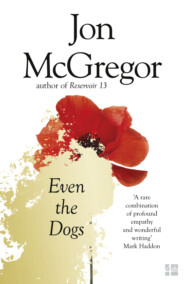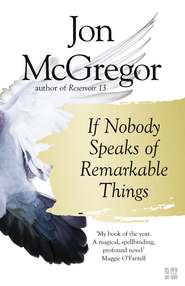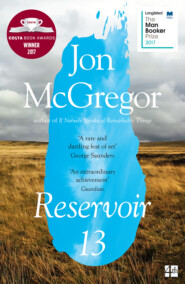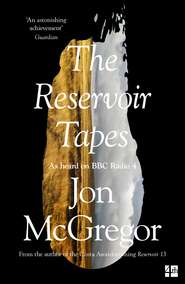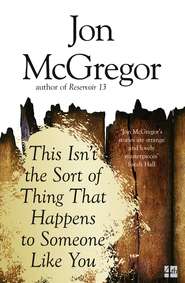По всем вопросам обращайтесь на: info@litportal.ru
(©) 2003-2024.
✖
So Many Ways to Begin
Автор
Год написания книги
2018
Настройки чтения
Размер шрифта
Высота строк
Поля
We’d been watching each other all evening, she told him as the first few bars of the music swelled up against the sound of the rain outside and David led them correctly away to the right, towards the tall potted yucca. That’s it! she said. You’re getting it now, back two three. I’d noticed him almost as soon as he came into the room, she said. The smart cut of his uniform, you know, and an awfully manly jaw, and very clear pale eyes. I caught him looking a few times, she said, smiling. Or he caught me looking, she added; turn two three. I suppose it depends which way you look at it. She laughed.
Major William Pearson stood in front of Julia’s table and introduced himself. Neither of them were surprised that he was there, after an evening spent watching each other’s movements – checking who the other may or may not be dancing with, hazarding a smile from across the room, murmuring excuse me as they came close to colliding by the doors to the terrace – and neither of them expected her to decline his invitation to dance. But still, she went through the formalities of reluctance, and her friends carefully looked away and pretended not even to have noticed that the gentleman they’d discussed all evening had finally crossed the floor to their table, and was as smoothly good-looking close up as he was from afar. He insisted, politely, and she stood, churning with excitement, and accepted his outstretched hand. Thank you, she said. I’d be glad to.
They strode to the middle of the room, offering each other their hands and waists just as the conductor was tapping his podium. William smiled, and their dance began. Neither of them said very much at first, beyond an exchange of polite enquiries, a compliment on the other’s dancing, a remark on the weather, concentrating instead on their crisp and flowing movement around the circular stage of the room. Moving away from her table, where her friends were speaking into their hands and offering gestures of encouragement as she looked over his shoulder towards them; turning across the floor to within earshot of her mother and father, her father looking rather glazed, her mother smoking a cigarette in an ivory holder and dropping her a wink in the middle of one of her actress friends’ long anecdotes; past a table of boys she recognised from the school opposite hers, boys she’d once gossiped about and spied upon but who from the vantage point of Major William Pearson’s arms now looked far more like boys than the men they were trying so hard to be with their fuzzy moustaches and their freshly signed papers; deftly sidestepping a waiter with a tray of drinks; twirling quickly away from a raucous gaggle of tail-coated medical students; changing direction, and pausing for a brief moment, in front of his table by the corner of the stage, the officers of his party in uniforms as smart as his, raising their glasses and making comments from the sides of their mouths before roaring with laughter and slapping each other’s knees – ignore them, he said quietly, smiling a little nonetheless – and she blushed and dropped her eyes for a moment; sweeping past the orchestra which seemed to be playing for the two of them alone, as if nobody else was there, and although she’d partnered dozens of men in that same dome-ceilinged venue, and although the music was more than familiar, the dance still felt brand new for them both.
They found themselves talking a little more, confident in their dancing, asking about each other’s lives, his short career in the army, her studies at drama school and her hopes of following her mother on to the stage. He talked about the prospects of war, the slim chance of it still being avoided. They both described their favourite walks, restaurants, pastimes, and they were both surprised by how soon they were sharing these small secrets and intimacies. And as they talked, almost forgetting that they were dancing at all, quite forgetting that others were dancing around them, or that they were not passing unobserved, they found that they were holding each other a little closer, a little firmer, his hand resting lower on her waist, his chest brushing lightly against hers, their hips even pulling tightly together once or twice; and they found that their voices were dropping lower, taking on a secretive inviting tone obliging the other to lean in a little closer to hear, tilting their heads to whisper in each other’s ear, turning their faces to catch the murmuring lips against their cheeks.
I still don’t really understand how it happened, she told David, dancing past the record player. I wonder if anyone really understands how it happens, when it’s like that, so immediate. How could we possibly have known what we were doing? What did we think we knew about love, or any of that business? He didn’t know how to answer her. He wasn’t sure if she was still talking about one dance, one evening, or the first weeks and months of their being together. He didn’t really understand her questions, and he was too busy concentrating on matching their steps to the music without colliding with the furniture. But she wasn’t really asking him at all, he realised later; she was asking the photograph of Major Pearson on the wall, or the music which skipped and bumped beneath the worn-out stylus, or the rain which spattered against the windows outside.
Later, she told him how reckless she thought they’d been. He presented it as a matter of practicality, she said, almost the same day as war was declared. He said that he’d soon be leaving for France, that an opportunity had arisen for the purchase of a house, this house, which would be unsuitable for a bachelor. He said there was no benefit to our endlessly hanging around. But the truth really, David, is that we were stupidly and drunkenly in love. We didn’t quite stop to think, she said. Not that I would have had it any differently of course, she added, but one does wonder.
One does wonder was a phrase she often repeated, always pausing before correcting herself in one way or another. But he was such a handsome man David! Such a handsome and exciting man! And when you’re young nothing else very much matters, does it? Only that this handsome chap is offering you a ring and wants you to be his wife. Patience and caution weren’t really in my vocabulary in those days, she told him, smiling, and he replied, teasingly, that he didn’t think they would ever be.
And as the record started again – we danced for a very long time, she told David; it seemed to go on for ever but then it was over far too soon – Julia and William danced once more around the room, past her friends, past his colleagues, past the waiters and the medical students, and back to her parents, pausing and turning while William cocked an eyebrow at her father, inclining his head towards Julia, and her father nodded, lifting up the palm of his hand as if to say certainly, be my guest, and they turned, stepped, stepped, turned away, their waltz bringing them over to the centre of the room where William dropped quickly to one knee. The conductor raised his baton, the musicians paused and the whole room leant forward to listen. Yes of course, she said. I’d be glad to, she said. And the music resumed, and the whole room applauded, and the pace of their dancing quickened as they whirled back and forth across the floor, rushing to make the arrangements, a best man, a bridesmaid, a church and a vicar, choosing the hymns and booking the hotel room, and before she knew quite what was happening her father had taken her by the arm and danced her down the length of the room, up past a pressing throng of friends and well-wishers, up to where the vicar waited and nodded his head in time to the waltz. Will you? he intoned to Major Pearson, and Major Pearson replied I will. Will you? he asked of Julia, and Julia smiled. Of course, I will. The vicar joined them hand in hand, and they danced back down the hall, confetti showered at their feet, William’s colleagues lining up to form an archway with their bayoneted rifles, a waiter leading the shout of hip-hip-hooray as Major and Mrs Pearson danced right out through the doors and into the hotel lobby, sweeping up the thickly carpeted stairs and straight into the first available room, William lifting Julia into his arms and slipping a coin into the bellboy’s hand.
And when they emerged, sometime later, the music was still playing. So they waltzed back down the stairs into the ballroom, and it seemed as though no one had noticed their return, the whole room dancing together now, and when Julia looked around she saw faces fixed with concentration, eyes focused on distant points beyond the room, people moving with a stiff-limbed determination, lips pulled up into forced blank smiles.
David had long sat down by then, too embarrassed to dance any more, muttering that he thought he had the hang of it and he was out of breath. But Julia had barely seemed to notice him moving away, still stepping around the room with her hands held out in front of her. She was talking quickly, stumbling, not looking at David or following the music, saying and then, and then, no, that’s not right, we, and then, as if everything had happened all at once, in that one room, on that one night, and not in the space of a few hurried months.
We only had a few days, she said, before he went away. It was difficult not to think about it, she said, raising her voice against the rain, turning to a slow halt, her hands falling to her sides, her face lined with shadows. The details of her story were becoming confused, and she seemed breathless, unsteady, nodding slightly in time with the music or in agreement with her own muddled recollections. He wanted the music to stop, or Julia to say something like, well really I think that’s enough for now, let me just sit down, but she didn’t. She leant back against the writing bureau, her eyes half-closed and her hands seeming to conduct the music, and she carried on talking.
He used to send me short little notes, she said. Writing wasn’t his strong point but I loved to get them all the same. He couldn’t tell me where they were, or what they were doing, but he’d mention little details about life with the men, and I’d feel almost as though I was there with him for a minute or two. I found out later that they hadn’t got all that far at all, she said softly; they were heading back to Dunkirk when they got caught out. Shelling, she said. She stopped for a moment, tipping her head towards the record player, listening to the music and smiling slightly.
In the ballroom, the dance floor less crowded than it had been a few moments before, one of the tail-coated medical students and his partner danced alongside William and Julia, matching their movements step for step, the student looking at Julia with interest. She glanced across at him nervously, and he said excuse me, I’m sorry, may I? reaching his hand out to her stomach, slipping a stethoscope from his inside pocket and looping its end inside her dress. I thought as much, he said, nodding to his partner; three months on, and they smiled and turned and twirled away. Julia looked down at herself, startled, and up at William, his thoughts seemingly somewhere else entirely. She took a few moments to compose herself, her heels clicking time across the ballroom floor, and then she leant forward to whisper in his ear: My darling William stop Pregnant stop Surprised but happy be careful I love you stop. Quietly, almost inaudibly, he replied, with a hoarse whisper in her ear: Surprised but happy also stop Suggest Laurence if a boy stop Be careful yourself all well here stop.
And almost while he was still speaking the blue sky of the ballroom ceiling was covered over with smoke and oily clouds, and a kettle-drum roll from the orchestra sent the soldiers in the corner, the officers of William’s party, clambering under a table which offered no protection when the mortar shells came raining down through the stained-glass skylight, tumbling and exploding directly amongst them, scattering shrapnel and mess tins and glassware and limbs.
There was a moment’s startled pause in the room, a dramatic swish of cymbals, and then the waltz continued, the waiters moving in with stretchers to take the bodies away, the medical students standing around to see if there was anything much they could do, a pair of maids hanging back with sponges and buckets and mops.
And the music was slower then, quieter, and many of the guests were returning to their seats, some of them even fetching their coats and heading for home, and Julia and William were soon the only ones left dancing, with small tired steps, back two three and turn two three, and William was silent and pale-faced in her arms, not meeting her eye, barely keeping a hold of her hand or her waist, his shoes dragging rather than smartly clicking across the polished floor. William? she said, and waited in vain for a reply. The music came to an end, and there was a strange crackling hiss as the musicians put down their instruments and the conductor turned to face the two dancers with a bow. There was no applause, and William broke away from her, not hearing her thank you or acknowledging her smile, lowering his head as he shuffled towards the table by the corner of the stage where his men had once sat. Julia crossed the dance floor for the last time and rejoined her friends at their table. They silently poured her a drink, avoiding her querying gaze.
Oh, she said, as she sat down, as if something she’d not thought of before had only just crossed her mind. Oh. She wondered what the crackling hissing sound could be. A young waiter glided past with a silver tray, turning and holding it out to her, indicating with a nod that the slim white envelope was for her. Oh, she said, again.
She showed David the two telegrams later in the evening, while he sat at the kitchen table drinking hot chocolate, the rain still pounding against the window and traffic sliding wetly through the street. She had them in a brown envelope, at the back of the useful drawer where she kept string and sellotape and candles and cotton wool. The paper was blackened and cracked along the folds, and one of the corners was stained with damp. He read both of them, the one beginning Surprised but happy also, and the one beginning Regret to inform, and he slid them delicately back into the envelope.
People are very resilient you know, she said to him later, when he pressed her about it. People find all manner of ways of working things out. I wouldn’t mind but it was just so quick, she said.
She stood up from the kitchen table, put the envelope with the telegrams back into the cluttered drawer, and headed out of the room.
I don’t think I’ll have any chocolate tonight, she said. Will you be okay to sort things out down here? All that dancing, she said, I’ve worn myself out, I’m not as young as I was. She stood in the doorway a moment and something blurred and drifted in her eyes, as though she was confused, trying to remember what she was doing. He turned in his chair, his bare feet cold on the stone floor, watching her.
Auntie Julia? he said, and she turned her focus back towards him.
Yes dear? she said.
What was he like though? he asked. When you knew him at least; what was he really like?
She looked at him, her hands weakly twisting and untwisting the hem of her long cardigan. She shook her head, as if she was still surprised.
I have absolutely no idea, she said.
9 Contract, wage slip, duty sheet, from Coventry Museum, 1964 (#ulink_d55a3f85-677d-51f7-9ff0-0a410953ed62)
They gave him a small rectangular name badge when he started work at the museum, three years after that opening night; its white plastic soon yellowed from sunlight and the nicotine stain of the staffroom. David Carter, it said, Junior Curatorial Assistant. His mother insisted on him wearing it when she took his first-day-at-work photo, and said it was a pity they didn’t give him a uniform as well but she supposed it was all modern these days. He told her that it was only the attendants who wore uniforms, but she said she couldn’t see the difference. She said oh if your father could see you now he’d be so proud, and he said do you think so? Julia, when she saw the photograph, sent him a postcard of the British Museum, with Onwards and upwards! written on the back.
His first day was a disappointment. He spent the morning being shown around the galleries by the Senior Keeper, despite knowing every last inch of the place, and the afternoon sitting in the staffroom while someone tried to work out what jobs they could give him to do. He’d half expected to launch his career with a dramatic discovery in some lost corner of the basement stores, or at the very least to be given immediate responsibility for the design and layout of a groundbreaking new exhibition. But instead he spent the first few weeks doing odd jobs for the rest of the curatorial staff; looking for records in the enormous card-index boxes, taking draft documents to the secretaries’ office to be typed up, checking the mousetraps and the thermohydrographs, keeping the stores spotlessly clean, making the teas and taking away the post. By the end of his first week he had an encyclopedic knowledge not of the archival filing system but of the milk and sugar preferences of each member of staff. It’s not what I thought it would be like, he told his sister, and she told him he’d better get used to it, he was the new boy, and what did he expect without any proper qualifications?
But after a few weeks things started to improve. He was assigned to the Keeper of Social History and cast more into the apprentice role that he’d been expecting. And once the Director had convinced himself that this was a career David was serious about, there was mention of training courses, placements, personal responsibilities. He began to be allowed away on research visits, to Leeds, Liverpool, Newcastle, as far north as Edinburgh and Glasgow, even Aberdeen. But he still spent most of his time flipping through card indexes, cross-checking records, inspecting stored objects, looking for mouse droppings in the basement, and it was a few years more before the job started to involve any of the work he’d imagined doing when he’d been a twelve-year-old boy poring over hand-drawn gallery designs and displays.
Julia came to see him after a few months, once he’d settled in. He was talking to an attendant in the foyer when she came through the main door; she stopped and looked for a long moment, surprised, she admitted later, by the pounding sensation of pride she’d felt.
Excuse me young man, she said, approaching him finally, Dorothy waiting by the door, I wonder if you might be able to show me around the museum? He turned to her, looking taller than she remembered, looking suddenly much older than the boy who’d visited her so often, and said I’m sure I can manage that Auntie Julia. She took his arm and let him lead her slowly around the first gallery, stopping to look at each of the display cases, asking questions, asking some of the questions more than once. He wondered if there was something wrong with her hearing. Dorothy had been before and hung back a little, noticing at the same time how grown-up David seemed and how much Julia had suddenly aged. She watched him showing Julia the case of medieval artefacts, lumps of pottery and ironware and stonework, most of it found during the recent rebuilding of bomb-damaged sites, scraped out of the mud as new foundations were dug into the ground. She watched him showing her the prehistoric case, a few bones and brooches and artist’s impressions, telling her that he didn’t think they were very reliably dated or sourced. Julia winked, lifting a finger to her lips. I won’t tell if you don’t, she whispered. He moved on to the natural history displays, a whole rack of beetles balanced on nail-heads, a cotton-wool drawer of speckled birds’ eggs, a tray of pinned butterflies, a panoramic landscape crowded with stuffed birds. His enthusiasm dropped when he showed her these; he half turned away even as he dutifully described each panel.
I don’t even know why they call it natural history, he said. It’s not the same at all.
Well, Julia said, starting to smile, gesturing towards the birds’ glassy-eyed gazes and tensed jaws, I’d say they were history now Daniel, wouldn’t you? She turned towards the other side of the room, but he didn’t move, looking at her curiously. Dorothy started to say something, but stopped herself, meeting David’s eye, shaking her head, glancing away. He hesitated, stepping towards Julia.
Auntie Julia? he said. She stopped a few feet away.
What’s that dear? she asked.
Auntie Julia, he said, you called me Daniel. She looked at him blankly.
No I didn’t, she said. Why on earth would I do a thing like that?
You did, he said, quietly insistent. You said Daniel. She turned to Dorothy, half-smiling, as if asking her what he was talking about. Dorothy shrugged, tutted, and peered closely at a case of flint axe heads. Julia looked back at David.
Don’t be silly, she said tiredly, indignantly. I think you need to get your ears checked, don’t you? And your manners. He watched her walking back down the gallery, sitting in a chair by the door to the foyer and looking pointedly away from them both. His mother nudged him. Well done, she murmured. Good work.
But by the time they rejoined her she seemed to have forgiven him, smiling pleasantly and waving her hand at the room. Are you going to show me around? she asked. He looked at her. Are you going to show me around? she asked again.
10 Letters, handwritten, 1966–68; Paper napkin, 1966 (#ulink_5874a919-70ba-5382-9edf-91c27197bdfc)
Their first letters were short, tentative, neither of them wanting to put into words what they had both felt the first time they met, neither of them wanting to allude to what could so easily seem absurd. I’m sorry but it’s so far away, they each imagined the other replying. It would be different if we both lived in the same town. Really, I’m sorry, but I barely know you at all. Instead, they asked each other polite questions, and wrote safe remarks about their own lives, as if they were pen pals enquiring about life in another country – What’s your house like? Do you have brothers and sisters? What’s your favourite film? Today I spent the whole afternoon up on Tullos Hill just looking at the sea. But gradually the questions, and the answers, developed into something more, something which began to imply a deepening interest in each other – What do you want to do when you’re older? Will you always stay in your town? Are you going out with anyone at the moment? And, gradually, they stopped worrying about how long the letters were becoming, and how frequent, and they started signing off with love, without quite thinking what it would mean, and they started writing things like: It would be good to see you soon. I can’t wait to see you. When will you be coming up again?
He had all her letters still, of course, filed neatly away in a shoebox with everything else in Kate’s old room, the tops of the envelopes smudged with fingermarks where he had taken them out and put them away over the years. And there were phrases he could quote from memory: It’s deadly boring working in the tea room but sometimes it’s worth it for the folk you meet. There are seals on the beach near here you know, I can show you if you’re ever up again. I heard there was a job going in the museum today. Isn’t it funny to think we almost never met?
He didn’t tell his mother, or Susan, but they both noticed the letters he’d started getting, and it wasn’t long before his sister asked him who they were from. It’s no one, he told her as they were walking to the bus stop one morning, David heading for the museum, Susan for her job in a solicitor’s office. Susan was still holding the latest letter just out of his reach, studying the envelope’s girlish scrawl, and David tried to look unconcerned. It’s just someone helping me with my research, he said. She looked at him over her shoulder, grinning, making a questioning face. What? he said. I met them when I went up there to study the museum. He grabbed at the letter but she pulled away from him, laughing.
Them? she said. Them? She stopped and turned around. What’s her name? she said. David looked at her, and realised that no matter how old they both got she would always be his older sister and would always eventually get her way. He was twenty-one but he might have been twelve for the way she was holding the letter away from him, taunting him with it. He gave her a shove, snatching the letter, and he couldn’t keep himself from smiling when he said Eleanor, her name’s Eleanor alright? She’s just a friend, alright? Susan gave him a shove back.
Alright, she said, she’s just a friend. David put the letter in his pocket, keeping his hand on it, running his fingers across the ink-smudged paper. Aren’t you going to read it? she asked, as they walked on.
No, he said. Not now.
Why? she said. It’s not private, is it? I thought she was just a friend? She nudged him again and this time when he looked at her it was with a smile which admitted something he wasn’t yet willing to say.
You won’t say anything to Mum though? he said quietly, just as they got to the bus stop. She looked at him, made a zipping her lips shut gesture, and winked.






